As a guest enters a hotel, few features of the experience are more critical to comfort and safety than the door lock. A hotel door lock serves not only to secure a room, but shapes the guest experience, provides privacy, and protects visitors and assets. To hotel owners and managers, understanding the range of locking systems—and how to choose the right one—is part of today’s hospitality management.
This comprehensive guide reminisces about the past of hotel door locks, dissects the most in-demand types available today, and quotes handy tips on how to install, care for, and prepare for tomorrow’s trends. Whether you own a boutique hotel or a large resort, or you are a visitor who asks yourself how your door is locked, this article has everything you’d like to know.
1. A Short History of Hotel Door Locks
The past of hotel security has dramatically evolved throughout the last century.
(1) Mechanical Beginnings
Early hotels employed only mechanical key-and-lock systems. Each room had a special key, typically large and cumbersome. Even though dependable, these locks were not secure—keys could be copied, and lost keys meant replacing the entire cylinder.
(2) Magnetic Stripe Cards
1970s introduced the revolutionary magnetic stripe card system. Guests were given a small plastic card with room details, which could be rapidly reprogrammed. Magnetic locks were convenient to manage keys but were prone to wear and demagnetization.
(3) RFID and Smart Access
By the early 2000s and late 1990s, there was radio-frequency identification (RFID). Contactless access, toughness, and additional encryption were offered by RFID cards. Today, mobile-based and IoT-integrated smart locks are the latest chapter, making it possible for guests to use smartphones or wearable devices as keys.
2. Types of Hotel Door Lock
Modern hotels are presented with an incredible range of door lock styles, from security to convenience and cost. Below is an in-depth description of the main hotel door locks that exist today, from the vintage hardware to the latest smart technology.
1) Mechanical Key Locks
These are the old-fashioned locks most people think of when they hear “hotel rooms.”.
Pin-Tumbler Locks: Most widely employed, operated by a metal key that raises pins to precise locations. They are secure but prone to lost or duplicated keys.
Mortise Locks: Housed within a recess in the door, offering tighter security and neater looks.
Deadbolt Add-Ons: Typically paired with an original latch for enhanced guest security.
Best for: Small B&Bs, budget hotels, or inns where lowest initial cost is of most concern and turnover is moderate.
2) Keycard Locks
Keycard technology revolutionized the hotel business by providing instant reprogramming and the elimination of cylinder rekeying.
Magnetic Stripe Cards
Guests place a thin card into a reader; the stripe contains encrypted information. Inexpensive and well accepted, but can demagnetize or wear out.
RFID (Radio-Frequency Identification) Cards
Tap cards or wave cards that simply tap or wave by the reader. They are wear-resistant, speed up check-in, and allow for greater encryption levels, and thus are the standard today.
Suitable for: Mid-range to high-end hotels with the requirement for a bullet-proof, scalable solution that offers efficient room reassignment.
3) Keypad and PIN Code Locks
Instead of a physical key, the guest enters a numerical code.
Stand-alone Digital Keypads: Battery powered and can be remotely reprogrammed or at the door.
Hybrid Keypad + Card Readers: Both PIN and card entry are enabled for guest preference flexibility.
Advantages are keycard elimination entirely and demagnetization prevention. Codes must be memorized by the guests, and codes must be updated regularly for security reasons.
Most suitable for: Small luxury hotels or vacation units where contactless self-check-in is an issue.
4) Mobile-App / Smartphone Locks
Also known as mobile key or Bluetooth/NFC locks, these are linked with hotel apps.
Guest receives a digital key on his smartphone.
Bluetooth or NFC communication opens the door when the phone is in range.
Supports remote check-in and can interact with loyalty apps or in-room controllers.
Potential drawbacks are guest phone battery life reliance and need for robust hotel Wi-Fi or cell signal.
Optimal for: Innovative hotels, business hotels, and chains wanting ease of simplified check-in and reduced keycard costs.
5) Biometric Locks
Biometric technology uses unique physical attributes for entry.
Fingerprint Scanners: Speedy and accurate; ubiquitous in high-end smart buildings.
Facial Recognition: Contactless but requires high-quality cameras and raises issues of privacy.
With extremely high security, biometric locks are expensive and may face guest privacy issues or local regulation.
Best suited for: High-end or highly secure buildings where convenience and high-tech status trump cost.
6) Hybrid & Integrated Locks
Most new systems combine two or more access methods.
RFID + Bluetooth: Guests may choose a card or smartphone.
Keypad + Mechanical Override: Provides access in the event of power failure or technical breakdown.
Hybrid solutions achieve a compromise between flexibility and fail-safe reliability.
7) Special Needs Locks
Specialized hardware is needed in certain hotel environments:
Automatic Sliding Door Locks: Used for ADA-accessible or high-end suites with sliding panels.
Multi-Point Locks: Provide added support for patio or balcony doors.
Energy-Saving Locks: Coordinate with room power control, operating HVAC only when locked by the interior.
8) Choosing the Right Type
The best hotel door lock is decided by:
Property Size and Guest Turnover: RFID or mobile solutions cater to large hotels with easy scalability.
Budget and ROI: Mechanical solutions are inexpensive in the short term but expensive in the long term.
Integration Needs: Smart locks integrated with Property Management Systems (PMS) make seamless operations possible.
Guest Expectations: Tech-savvy travelers increasingly demand contactless options.
3. Most Important Features to Keep in Mind When Choosing a Hotel Door Lock
Security Certifications and Encryption: Verify ANSI/BHMA or CE certifications and maximum encryption levels to deter unauthorized usage.
PMS Integration: Smooth integration with property management systems enables effortless check-ins, check-outs, and room modification.
Industry Efficiency and Battery Life: Extended battery life is cost-effective in maintenance and avoids shock due to unexpected lockouts.
Audit Trails and Access Logs: Electronic locks can record each entry, with security investigations being possible.
Emergency Override and Fail-Safe Modes: Provide ways for people to enter rooms in event of emergencies and for stopping tampering.
4. Hotel Door Lock Installation and Maintenance
Pre-Installation Considerations: Before locking selection, consider door material, fire codes, and compatibility with installed infrastructure.
Step-by-Step Installation: Professional installation generally includes lock body mounting, reader connections, and electronic interface testing. Installation normally occurs during off-peak occupancy to prevent guest disruption.
Regular Maintenance
- Battery Replacement: Battery replacement usually occurs every 12–18 months on most electronic locks.
- Firmware Updates: Maintains software security current and in sync with PMS updates.
- Physical Checks: Inspect latches, screws, and card readers to prevent mechanical failure.
- Regular maintenance does not cause unexpected downtime and extends the life of the lock.
5. Hotel Door Lock ROI and Cost Considerations
Hotel door locks cost rather differently:
- Mechanical Locks: $30–$80 per door
- Magnetic Stripe Locks: $100–$150 per door
- RFID Locks: $150–$250 per door
- Smart Locks: $250–$500+ per door
Add to initial cost: consider training employees, replacing batteries, and licensing software. The best smart locks are expensive to buy but save money on operations and boost guest satisfaction—creating a great long-term return on investment.
6. Hotel Door Lock Security Best Practices
To protect property and guests:
- Access Control Policies: Provide staff personnel (housekeeping, maintenance) access levels to avoid unwanted room access.
- Regular Audits: Audit access logs for unusual patterns on a regular basis.
- Handle Lost Credentials Quickly: Immediately suspend lost keycards or mobile keys.
- Staff Training: Educate staff on emergency override procedures and key handling.
7. Hotel Door Lock Future Trends
The future of the hotel sector starts with an age of intelligent security, and at the center of it all are the hotel door locks. Over the next decade, several drivers and innovations will revolutionize the manner in which hotels manage access to the rooms and secure their visitors.
1) Biometrics Become Mainstream
Biometric authentication—fingerprint scanning, facial recognition, or iris scanning—is unsurpassed when it comes to security and convenience.
Guest Experience: A touch or glance can open, cards and phones not required.
Operational Efficiency: Removes key management and unauthorized duplication.
Challenges: Data privacy laws (e.g., GDPR) and cultural norms require that hotels implement strong data protection policies and are able to obtain express guest consent.
2) Smartphone and Wearable Integration
Smartphone keys are now being introduced to smartwatches and wearables.
Hands-Free Entry: Visitors can walk in and automatically open the door using Bluetooth Low Energy (BLE).
Single-App Hospitality Apps: Keys will be integrated with check-in, payment, and concierge into a single app, offering end-to-end guest experience.
Offline Capability: New standards will enable doors to open even in the absence of Wi-Fi or cellular network connectivity, ensuring reliability.
3) Artificial Intelligence-Based Access Control
Artificial intelligence will help hotels monitor and forecast security needs in real time.
Anomaly Detection: AI can recognize atypical access behavior—i.e., repeated failed login attempts—and signal security staff in real time.
Predictive Maintenance: Software can forecast battery drain or mechanical wear and tear and trigger preventive maintenance before damage occurs.
4) Cloud-Based Central Control
Cloud-enabled locks allow managers to remotely control and manage access privileges.
Instant Room Reassignment: Front desk personnel or computer systems can reassign rooms without resetting individual locks.
Data Analytics: Single-source data delivers information on occupancy habits, staff traffic, and energy consumption.
5) Enhanced Sustainability
Green design is increasingly becoming a necessity:
Low-Power Devices: Future locks’ low-power electronics provide longer battery life and reduce waste.
Recyclable Materials: Biodegradable plastics and recyclable metals are being tried out for lock casings by companies.
Energy-Tied Systems: Smart locks and thermostats have the ability to enable energy-saving modes upon guest checkout.
6) Multi-Factor & Adaptive Authentication
Future hotel locks will have two or more authentication factors, such as a phone key coupled with a biometric scan. Adaptive systems will dynamically improve security if there is a suspected unusual scenario—like a new device login—like online banking.
7) Integration with Smart-Room Ecosystems
Hotel locks will be endpoints in an extended Internet of Things (IoT) network.
Opening the door will have the capability to automatically adjust lighting, temperature, and even music selection.
Housekeeping and maintenance staff will be automatically notified when a room is left, improving turnaround efficiency.
8) Blockchain for Access Credentials
Certain inventors are looking into blockchain technology for the safe storage and authentication of digital key information. Decentralized credentials reduce the threat of hacking and simplify cross-platform integration with loyalty programs and third-party reservation websites.
9) Voice and Gesture Control
Hands-free operation will expand to include voice commands and simple gestures—particularly appealing in luxury suites or for guests with accessibility needs.
10) Looking to the Future
To hotel owners and managers, the message is flexibility. Investing in hardware that is firmware updatable and has open APIs will result in last week’s installation adapting to address next week’s innovations. Biometric locking, analytics-based on artificial intelligence, and materials that are environmentally friendly are a few instances of the next generation of hotel door locks with an integrated blend of increased security, lower energy utilization, and guest amenity that will redefine the hospitality experience.
8. Hotel Door Lock Buy Guide & Supplier Tips
Choosing the right supplier matters:
- Evaluate Experience and Support: Choose suppliers with hospitality experience and 24/7 support.
- Ensure Compatibility: Be compatible with your PMS and other hotel systems.
- Secure Demo Units: Stress-test durability, battery life, and usability before a mass implementation.
- Search for Warranty & Service: A good warranty reduces long-term risk.
Such worldwide popular brands include ASSA ABLOY, dormakaba, and Onity, yet there are plenty of regional providers that offer similar competitive products as well.
9. Traveler’s View: Guest Tips
Guests can also benefit from hotel lock knowledge, In today’s tutorial, we want to share with you some tips from a guest’s perspective:
- Use the Deadbolt: Always engage additional latching or deadbolt features when you’re inside.
- Report Malfunctions: Report to the front desk if your keycard is not functioning or if the door is out of sync.
- Keep Your Keycard Safe: Keep it away from electronics and magnets to avoid demagnetization.
- Privacy Awareness: Use the “Do Not Disturb” sign and require housekeeping staff to knock and identify themselves before entering.
10. Conclusion
Door locks in hotels have changed from traditional mechanical keys to sophisticated smart systems. To the owners of hotels, the expense of an integrated secure locking system provides guest convenience, guards property, and maximizes day-to-day operations. For guests, familiarity with such types of systems reassures them and ensures a safe stay.
With proper considerations of technology nature, topmost characteristics, installation requirements, and future direction, hoteliers can select a door lock system that addresses cost, convenience, and security implications—offering each guest an guaranteed and trouble-free stay.

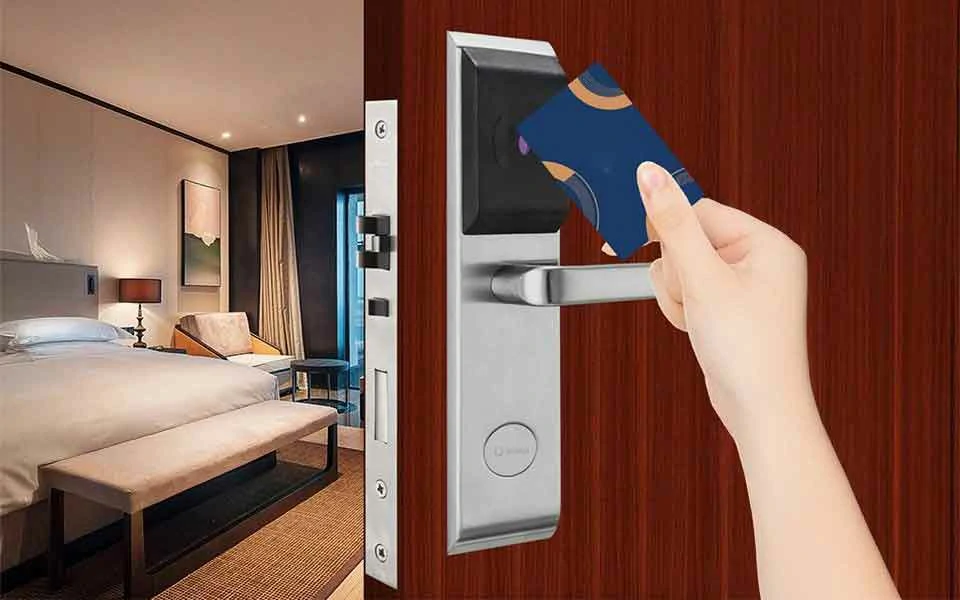
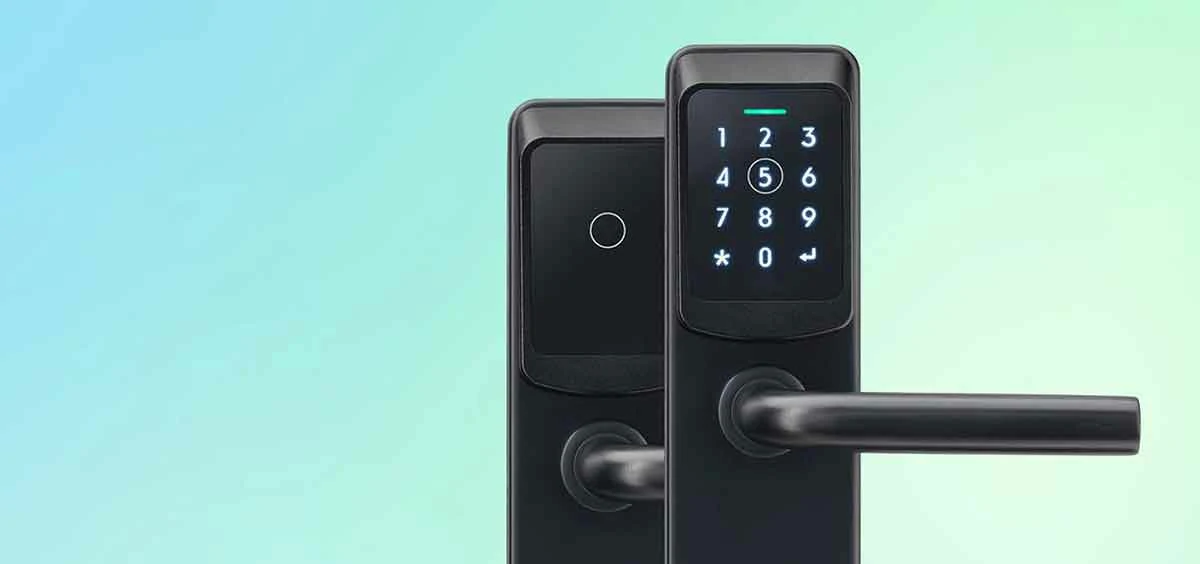
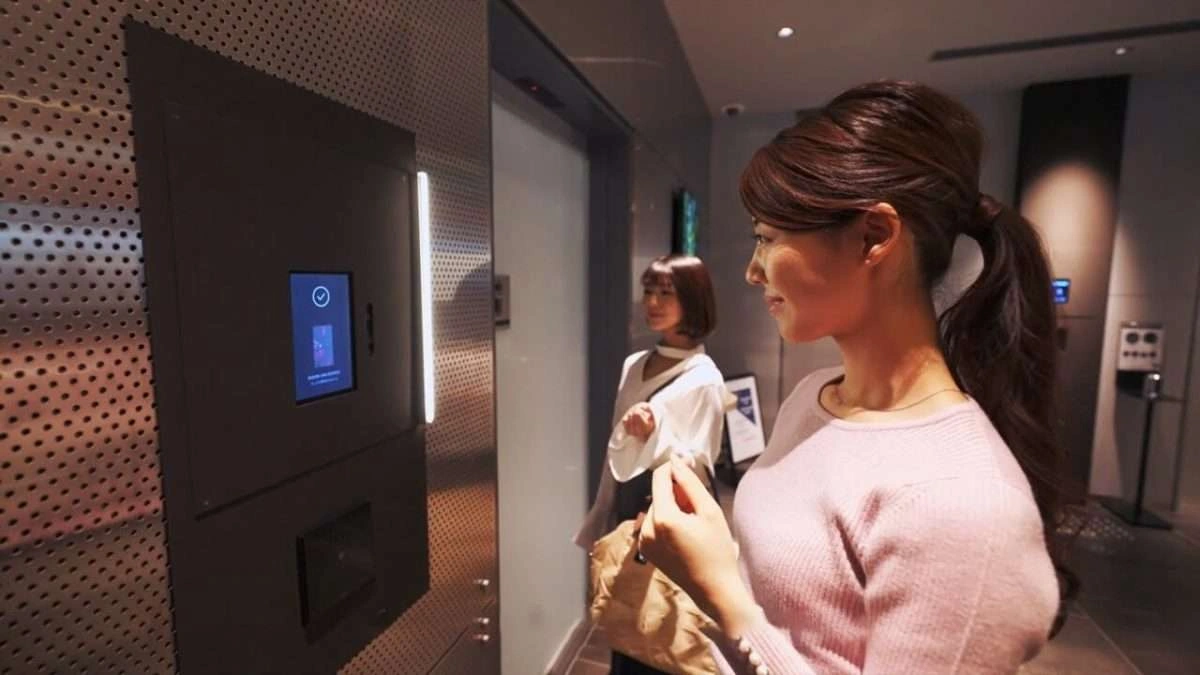
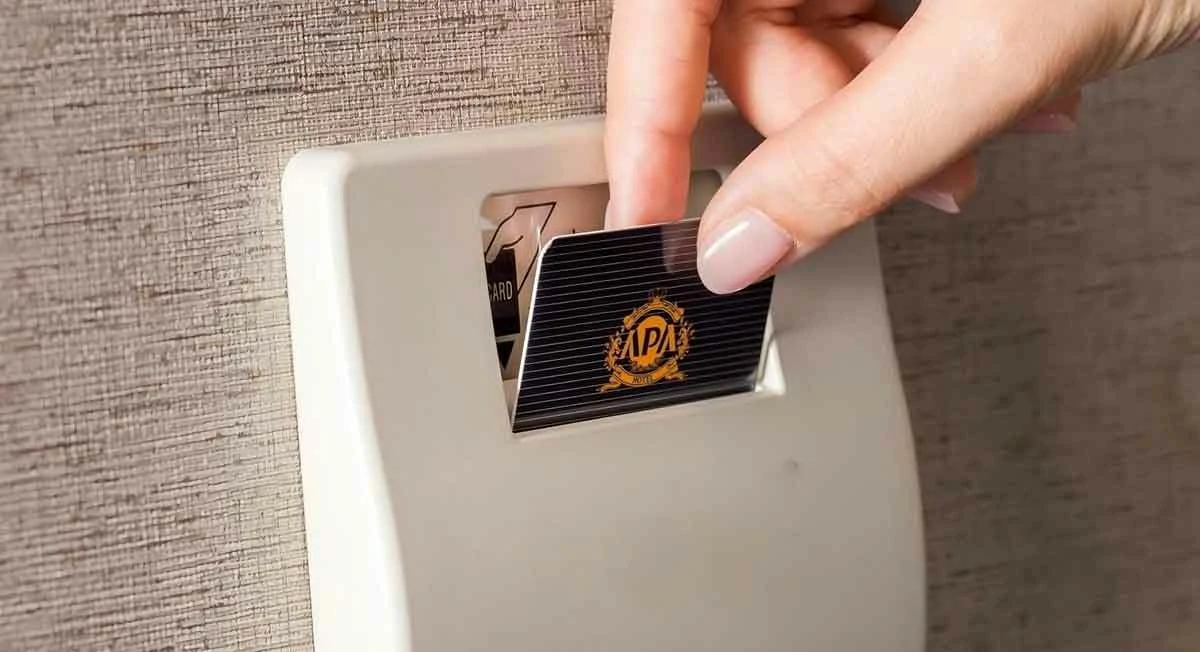
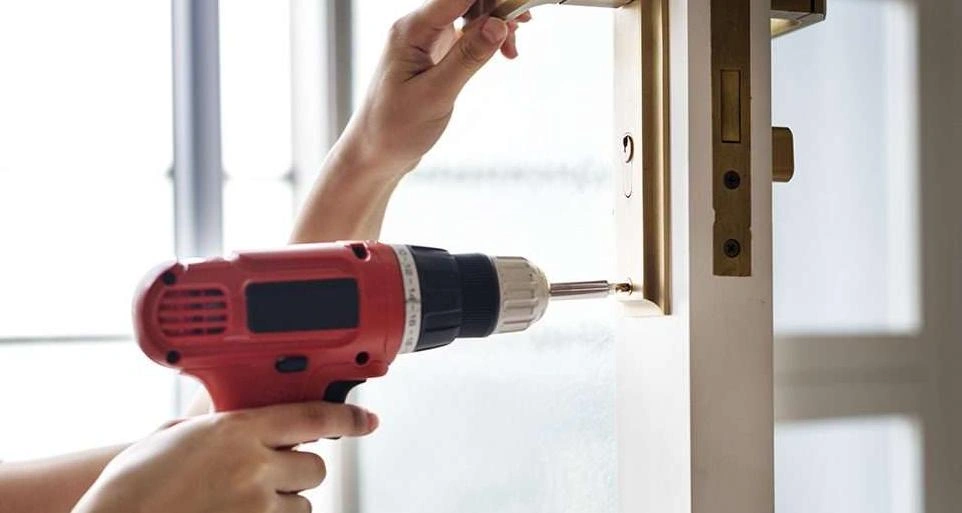
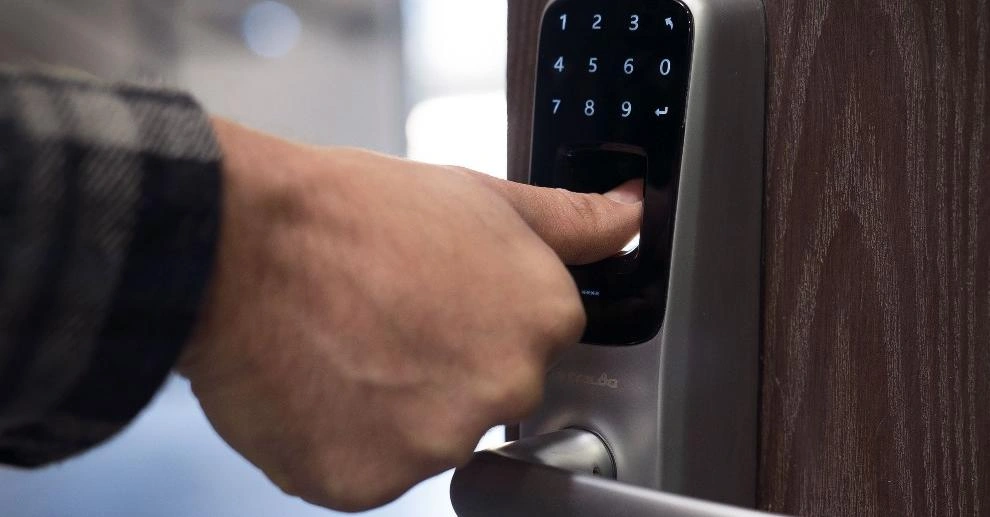
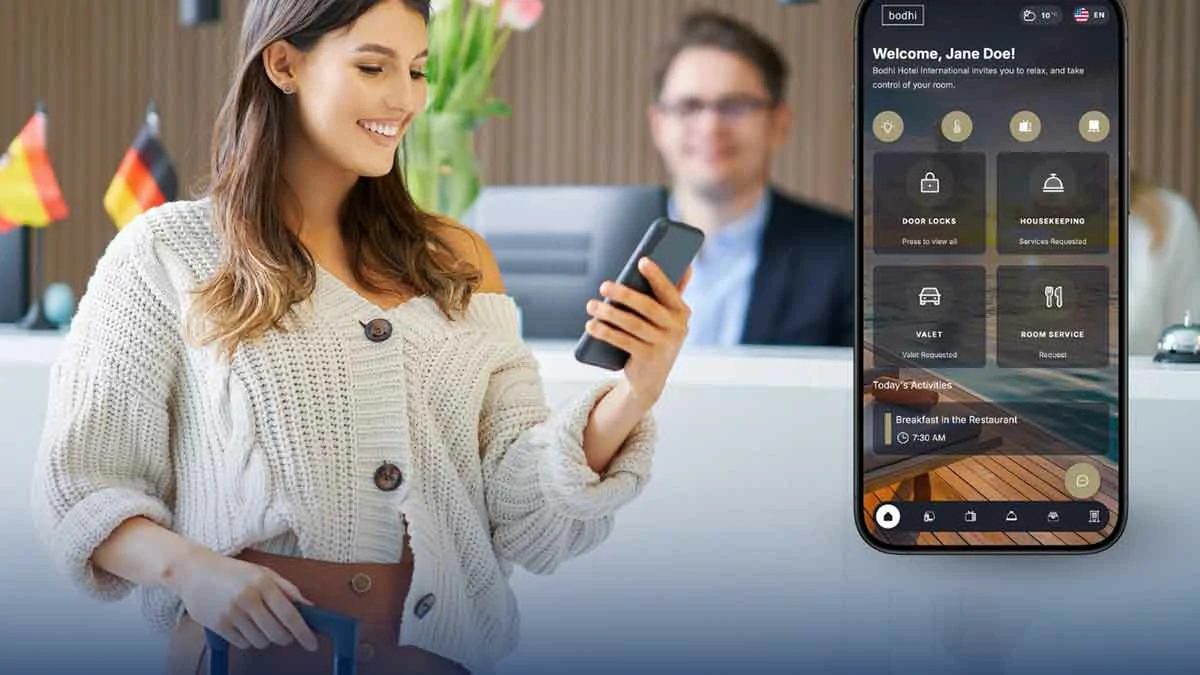
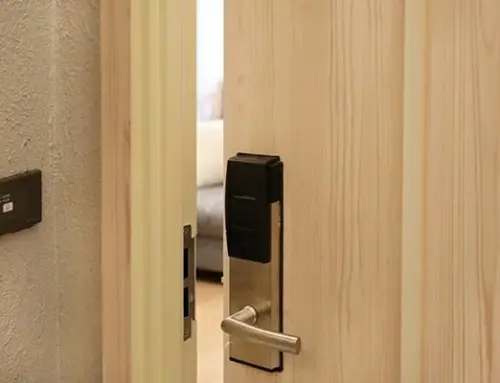
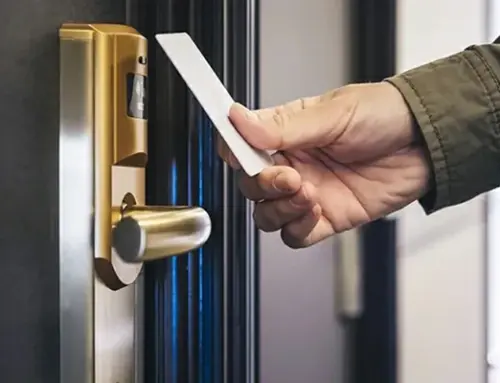
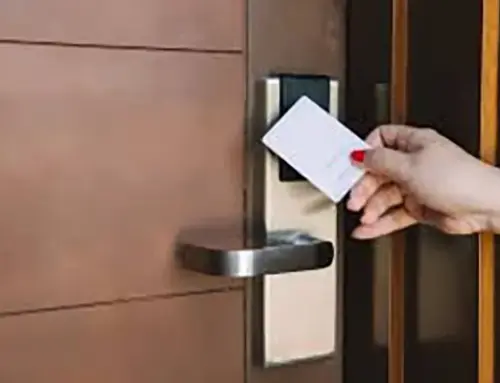
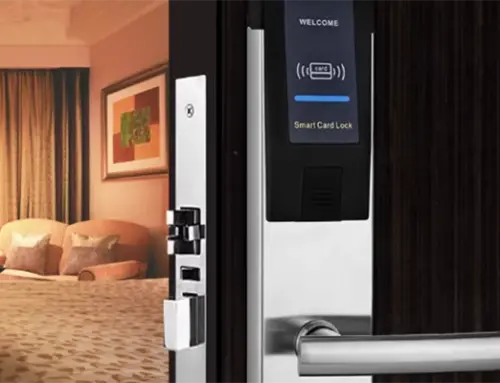
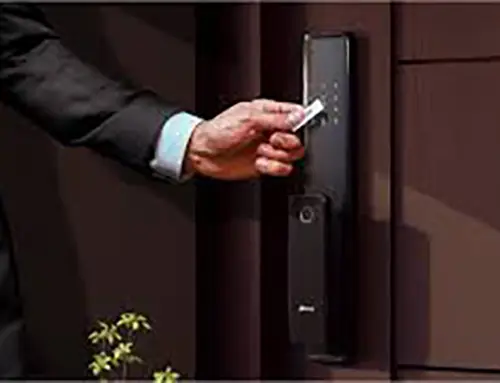
Leave A Comment